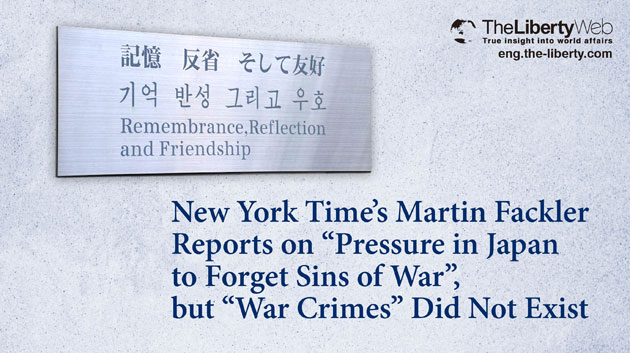New York Time’s Martin Fackler Reports on “Pressure in Japan to Forget Sins of War”, but “War Crimes” Did Not Exist
The online version of the New York Times recently featured an article entitled “Pressure in Japan to Forget Sins of War”.
The article focused on the use of forced Korean labor during the war to build the Asajino airfield in Sarufutsu, Hokkaido. Also featured was how the Hokkaido Forum, which was jointly created by the South Korean government and Japanese citizens groups, failed in its attempt to build a cenotaph to these Korean laborers. The article also criticized how the Japanese public is succumbing to the protests of right-wing groups.
The South Korean paper Chosun Ilbo’s in its online edition also featured a similar article on October 30th. In addition to the failed attempt to build the cenotaph, the article gives an account of how the government of Gunma Prefecture is calling for the removal of a monument to Korean laborers in the public park, “Gunma no Mori”.
This monument was built to pay respects to Korean laborers brought to Japan during the war, but there were remarks engraved on the monument that portray Japan as an aggressor, to which the prefectural government points out that “there are suspicions of political motives” which breach the urban parks law.
Overseas media outlets occasionally provide such criticisms of Japan, but Japanese society is by no means succumbing to the pressures of right-wing organizations. In fact, the truth is that there are no “war crimes” relating to forced Korean labor.
During the war, Koreans were Japanese citizens, and were recruited and paid to work in the Japanese defense industry just like other Japanese citizens. As the course of the war deteriorated, a home-front draft was ordered on the Japanese homeland in 1939 to recruit citizens to work in industry, but a similar draft was not applied to Koreans until 1944, showing the degree to which Koreans were treated favorably, even compared to the Japanese.
The monument in Gunma has the following words inscribed on it: “As we have entered the 21st century, we deeply repent upon the damage and suffering that our nation inflicted upon the Korean people, and vow to never again make the same mistakes.”
However, the reality is that after the Japan-Korea Annexation Treaty, rapid modernization took place on the Korean peninsula through investments in education, as well as the construction of railways and dams. South Korea should be the one to face up to this history.
In fact, there are many Asian nations that are not in the least bit critical of wartime Japan.
The only nations that publicly criticized Japan’s war crimes in Asia are North and South Korea, and China. Nations such as the Philippines, Malaysia, and Taiwan are very pro-Japanese. The criticisms based on the Nanking Massacre and the alleged issue of the Comfort Women are nothing more than anti-Japanese propaganda designed to instill a sense of guilt upon Japan, such that these nations continue to demand reparations.
A mistaken historical narrative saps the sense of patriotism from the Japanese public. As the 70th anniversary of the end of the war approaches, perhaps this will be the year when Japan’s true history will be reclaimed, and a return of pride to a well-deserving nation.



















